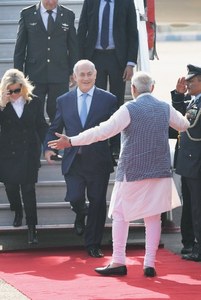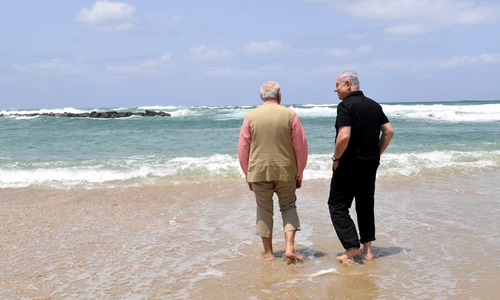ON his recent four-day visit to India, Israeli Prime Minister Bibi Netanyahu said during a TV interview that the relationship between the two countries was “a marriage made in heaven”. But according to our Senate Chairman Raza Rabbani, speaking recently in Tehran, it was more of a union conceived in hell.
He “warned the Muslim world that the emerging nexus between the United State, Israel and India is a major threat to the ummah”.
Had Mr Rabbani been entirely frank, he would have included Saudi Arabia in this alliance. By its words and deeds, the kingdom has quietly supported Israel while paying lip service to the idea of an independent Palestinian state. But by applying pressure on Mahmoud Abbas, the president of the Palestinian Authority, to accept the American decision to move its embassy from Tel Aviv to Jerusalem, Mohammed bin Salman, the crown prince and de facto ruler, showed us where his sympathies truly lie.
For years, India has been trading with Israel and has diplomatic relations with the Zionist state. Thousands of Israeli tourists flock to India every year. Currently, Israel is the third largest weapons supplier to India after the United States and Russia. But earlier Indian governments tended to keep Israel at arm’s length, given the pro-Palestinian sentiments that used to run deep in India.
In pictures: Mixed emotions as Israeli PM Netanyahu visits India
Judging from the warm welcome Netanyahu received, and the lack of any significant demonstrations against his visit, it seems clear that public opinion in India has undergone a huge change.
And of course there is a convergence of interests between the two countries. Israel manufactures and exports a large number of very sophisticated weapons systems. Last year, its weapons exports hit $6.5 billion.
On his recent visit, Netanyahu managed to revive a possible deal for anti-tank missiles worth $500 million. Earlier, the Israeli offer had been shelved as India was considering developing and building the missiles locally. Israel’s experience and expertise in arid area farming is highly relevant to Indian conditions. It has also offered to train Indian security forces in anti-terrorist operations.
Read: Netanyahu hails new era in ties with India
While Indian reasons for joining the nexus Raza Rabbani spoke of are clear, Saudi Arabia is obviously aiming to please the United States by currying favour with Tel Aviv. According to one saying in the Middle East, “the road to Washington passes through Tel Aviv”.
When Obama took a more even-handed position towards Iran, he infuriated the Saudi ruling family. Trump, in his crusade to undo his predecessor’s policies, has gone to the other extreme by threatening to abrogate the nuclear agreement with Tehran that was painstakingly arrived at in partnership with Germany, France, Britain, Russia, China and the UN. This is music to Israeli and Saudi ears, both of whom are itching for the US to take action against Tehran.
Those Pakistanis who, in the wake of Trump’s anti-Pakistan tweet-storm, comfort themselves with the notion that our close links with China and Saudi Arabia will protect us need to wake up and smell the coffee. The kingdom’s openly pro-Israel, pro-US position will bring it closer to India. In Pakistani planners’ zero-sum game — where every gain for India is a loss for Pakistan and vice versa — this would be a disaster. And while China, seeking to neutralise India, will continue supporting Pakistan, it will not issue any blank cheques. It certainly will not get drawn into yet another Indo-Pak conflict.
One of the functions of diplomacy is to prevent hostile powers from ganging up, and to enter defensive alliances to enhance security. Judging by these yardsticks, we have failed miserably. Isolated as seldom before, international support for our single-point Kashmir agenda has dwindled.
One reason, of course, is that India is now globally acknowledged as the pre-eminent regional power, apart from being a major player in the world economy. Pakistan, by contrast, is widely perceived as an irresponsible exporter of jihadist terror and ideology. The fact that Hafiz Saeed, viewed as the architect of the Mumbai attacks of 2008, is still free 10 years later, is held up as an example of Islamabad’s perceived duplicity.
Related: US, India urge Pakistan to prosecute Hafiz Saeed 'to the fullest'
China, too, is upset with our inability or unwillingness to control extremist elements who pose a threat to the many Chinese engineers and workers in Pakistan. Indeed, Beijing has repeated its advice to restore political stability in the country that has the potential to derail the CPEC initiative. Clearly, our “all-weather friend” is alarmed at its partner’s dysfunctional politics.
I don’t often agree with Nawaz Sharif, but he was absolutely right when he said we should put our house in order. Countries like Saudi Arabia and China brook no opposition, and cannot understand how a government can allow political rivals to bring the country to a halt whenever they like. Even democracies like the US do not permit unfettered street protests.
In a sense, we have created our own isolation through rigid, unimaginative policies that are out of touch with the real world. But our diplomats aren’t the only ones to blame: the truth is that our foreign and security policies are shaped almost exclusively by the military establishment. The result is before us.
While our commentators and politicians have suggested that losing out on US military assistance isn’t a very big deal, the reality is that American arms gave us a technological edge that Chinese weapons still can’t. India, on the other hand, is acquiring sophisticated weaponry from the US, Russia and Israel.
Our shaky economy clearly can’t sustain an arms race with our neighbour, and the sooner sane, rational diplomacy comes into play, the better.
Published in Dawn, January 22nd, 2018













































